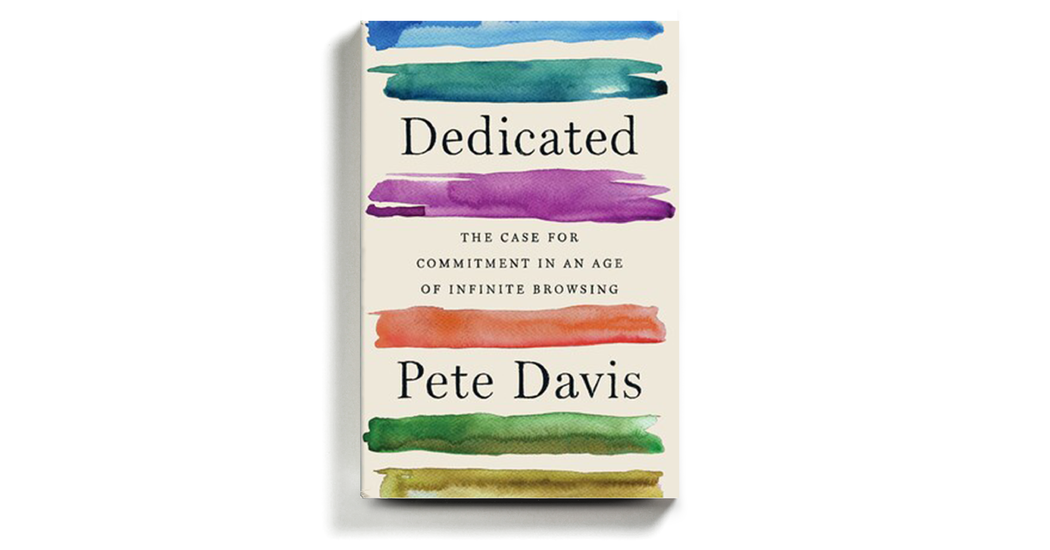
Before reading “Dedicated,” a new book by Pete Davis, I hadn’t realized that the acronym YOLO — you only live once — wasn’t always a celebration of doing something fleeting and reckless just for the thrill of it. One of its earliest public uses is attributable to the Grateful Dead drummer Mickey Hart; in the early 1990s, Hart poured his resources into a California property he called the YOLO Ranch, building a recording studio and creating a hub for the music community.
“YOLO, it turns out, was conceived as a message of diving into attachment, not freeing yourself from it,” Davis writes. “Better go deep, because you only live once.”
“Dedicated” is Davis’s attempt to make this case — to show that commitment, so often associated with conservatism and traditionalism, can be a radical act. There’s clearly an appetite for Davis’s message; the book grew out of a graduation speech he gave for his class at Harvard Law School in 2018, which has been viewed online some 31 million times. Watching it, you see an affable Davis deliver what is essentially the beginning of the book, starting with the highly relatable quandary of getting stuck in what he calls Infinite Browsing Mode: scrolling through the countless possibilities on Netflix without ever settling on anything. “I’ve come to believe that this is the defining characteristic of my generation,” he writes in “Dedicated.” “Keeping our options open.”
What follows is a combination of cultural jeremiad, self-help guide and call to action. Davis marches through a parade of extremely sober references that include the American novelist Don DeLillo and the Polish sociologist Zygmunt Bauman, but he’s too optimistic to sound like a scold. Part of his argument is that the grinding, painstaking work that commitment entails is necessary to effect any lasting transformation. He concedes that proposing a “Counterculture of Commitment” is a hard sell in the “Culture of Open Options.” (I couldn’t decide if his shorthand was corny or useful; I came to think it was both.) Commitment requires trust, a sentiment that takes time and effort to build and is in awfully short supply these days.
“You have to earn someone’s trust before you can start doling out advice,” Davis writes. He’s explaining the kind of outreach involved in political movements, but it also applies to what he’s trying to do with this book. In a bid to earn a reluctant reader’s trust, he says that he understands why many people prefer browsing to committing. First, there are the obvious pleasures to be had. Novelty is stimulating. You can try new things without risking too much. Second, commitment can be not only unpleasant but also oppressive. A culture of involuntary commitment expects people to live a certain way, whether they want to or not. Not that long ago, women were supposed to stay married even if their husbands were abusive. Black people’s lives were circumscribed by segregation. Gay people stayed closeted.
“Liberation, space, openness, relief, wholeness — that’s what authenticity feels like,” Davis writes. There are both personal and social benefits that flow from flexibility. He concedes that emancipatory movements freed people from the stifling grip of convention. But he also argues that we have focused too much on liberation, and not enough on dedication — on giving oneself over to a bigger cause, deliberately chosen.
Discussing the Black Freedom Struggle, Davis laments the cultural tendency to fixate on the grand gesture instead of the millions of tiny steps that paved the way. “We remember Martin Luther King Jr. for his cinematic dragon-slaying — his iconic speeches and confrontations — but what’s lost is all the long-haul work that queued up those moments,” Davis writes. When Rosa Parks was arrested, she had been working for the Montgomery, Ala., branch of the N.A.A.C.P. for a decade. Medgar Evers was assassinated in his driveway as he returned home from a meeting. Davis tells us not to overlook the meeting. Not only had Evers given his life to the cause; he had dedicated his life to it.
“Dedicated” is occasionally moving, but it isn’t unsettling. There’s something of the earnest law student about it; the writing feels assiduous and conscientious, as Davis takes care to persuade us that between the zealots of the past and the zealots of the future, there really is a third way. We can have the good stuff of tradition and commitments without the bad stuff — or at least without some of the bad stuff; Davis says that seeing something through requires weathering certain discomforts.
A number of those discomforts may come from other people. Davis includes a chapter on community-building, acknowledging that “you associate with something because you like parts of it, but nobody likes all the parts of it.” He quotes the Jesuit theologian James Keenan, who memorably defined mercy as a “willingness to enter into the chaos of another.” Davis doesn’t talk much about new technology other than social media, but I have often wondered at the ability of technology to insulate us from others, so that interactions happen at our own convenience and according to our own terms. As we talk about the need to be more tolerant in the abstract, we seem comparatively less motivated to be tolerant in the particular.
“Making change often looks less like designing and executing a battle plan and more like cultivating and maintaining a relationship,” Davis writes. I was intrigued by this idea, and I was hoping he would return to it in the end. Instead, he closes out the book with the analogy of cultivating a garden, of dedicating ourselves to something that will require “a lot of work without immediate gratification.”
Given the book’s emphasis on not just confronting difficulty but delving into it, the gardening bit feels a little too comfortable and familiar. Rhetorically, though, it makes sense: The metaphor of a plant is easier to accept than the chaos of another. Davis’s point is that we have to start somewhere. He has planted a seed with this book. Now watch it grow.





